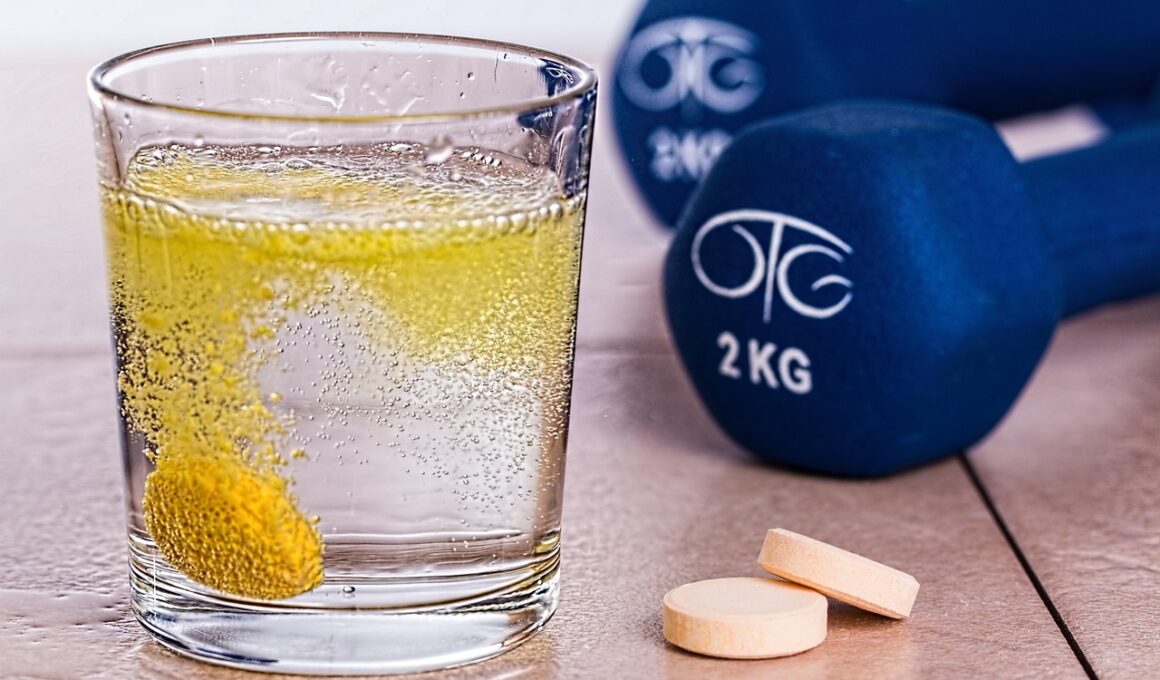How Vitamin B Complex Helps Reduce Inflammation After Workouts
Vitamin B complex supplements play a significant role in supporting overall health. These essential vitamins work collectively to enhance metabolic processes, particularly after vigorous exercise. When we engage in intense workouts, our body undergoes numerous physiological changes that can lead to inflammation. Vitamin B complex helps by promoting a healthy inflammatory response. B vitamins such as B6, B12, and folate contribute to the synthesis of neurotransmitters, which can modulate pain and inflammation levels. Additionally, these vitamins support energy production by converting food into usable energy, essential for post-workout recovery. Regular intake of vitamin B can ease muscle soreness and improve recovery times, allowing the body to bounce back more rapidly. Moreover, individuals who exercise regularly may have an increased need for certain nutrients to maintain their performance and health. Ensuring adequate levels of vitamin B can help athletes and fitness enthusiasts meet their nutritional needs, preventing deficiencies that could hinder recovery and performance. In conclusion, vitamin B complex supplements can play a vital role in reducing inflammation after workouts, fostering a quicker recovery process for athletes and active individuals alike.
Beyond inflammation reduction, vitamin B complex supplements provide various health benefits. These vitamins are crucial in supporting brain health and cognitive function, enhancing focus, and improving mood. This is particularly important for those engaged in regular exercise, as maintaining mental well-being can be just as essential as physical fitness. B vitamins, including B1 (Thiamine) and B3 (Niacin), are vital for energy metabolism and brain function. They help supply the brain with the necessary energy to carry out its functions, improving overall cognitive performance. Furthermore, B vitamins like B12 are instrumental in the production of red blood cells, which carry oxygen throughout the body. Proper oxygenation is critical after intense workouts, facilitating recovery and preventing fatigue and malaise. Adequate levels of these vitamins also contribute to reducing fatigue and enhancing endurance, which may lead to improved athletic performance. For anyone aiming to enhance their fitness routine, considering a vitamin B complex supplement is a good idea. As they offer a range of benefits that extend beyond inflammation reduction, they can significantly contribute to overall well-being and performance.
The Role of Vitamin B6 in Recovery
Vitamin B6, a key player in the vitamin B complex, holds particular importance in muscle recovery and repair. This vitamin is essential in protein metabolism, which is vital for muscle recovery following strenuous workouts. When we exercise, tiny tears occur in our muscle fibers, and adequate levels of vitamin B6 can aid in the repair process. It helps facilitate the synthesis of neurotransmitters that are crucial for muscle function. Additionally, vitamin B6 plays a role in synthesizing hemoglobin, which transports oxygen to muscles during exercise. Enhanced oxygen delivery is necessary for efficient muscle recovery and reduced soreness. Moreover, studies show that vitamin B6 can help regulate inflammatory markers, further supporting its role in post-exercise recovery. For individuals who engage in heavy lifting, endurance training, or high-intensity workouts, supplementing with vitamin B6 may provide additional recovery benefits. Incorporating vitamin B6 into your supplement routine can facilitate quicker recovery periods, allowing for more effective training sessions. When considering the overall beneficial effects of vitamin B complex, ensuring sufficient intake of vitamin B6 becomes increasingly relevant for those committed to their fitness journeys.
Vitamin B12 is another critical nutrient in the B complex that contributes to post-workout recovery and overall health. This vitamin is renowned for its influence on energy metabolism and red blood cell production. When engaging in vigorous workouts, the demand for oxygen in our body increases significantly. B12 helps improve oxygen transportation by facilitating red blood cell synthesis. This aspect is crucial for athletes as it supports enhanced endurance and performance levels. Furthermore, vitamin B12 plays a role in cellular repair and maintenance, which is vital for recovery after exercise. Its influence extends to reducing feelings of fatigue and promoting mental clarity, making it easier to tackle subsequent workouts. Additionally, B12 supports maintaining a healthy nervous system, which is essential for muscle coordination and overall athletic performance. For vegetarians or individuals with specific dietary restrictions, supplementing with vitamin B12 may be particularly important due to its prevalence in animal products. Therefore, including a B12 supplement could benefit those engaging in intense physical activity, enhancing their overall recovery experience and workout efficacy.
The Impact of Folate on Inflammation
Folate, also known as vitamin B9, is one of the lesser-known members of the B complex that has significant implications for exercise recovery and inflammation reduction. Folate plays a key role in the synthesis of DNA and RNA, critical processes that ensure efficient recovery at the cellular level. During recovery, the body performs cellular repair, and adequate folate can enhance this restorative process. It works by supporting healthy cell division and growth, which is vital after strenuous workouts that cause muscle and tissue breakdown. Additionally, folate contributes to lowering homocysteine levels in the body, an amino acid linked to increased inflammation. Lower homocysteine levels may correlate with reduced inflammatory markers, promoting faster recovery during workout regimens. Furthermore, folate aids in red blood cell formation, ensuring adequate oxygen supply to tissues, which is crucial for recovery. Integrating folate-rich foods like leafy greens, legumes, and eggs into your diet or supplementing with folate can immensely support post-exercise recovery. Optimal folate levels help mitigate inflammation and bolster overall recovery strategies for individuals, making it a valuable nutrient in a fitness-driven lifestyle.
The synergy of B vitamins is another significant aspect to consider regarding inflammation and recovery. Each vitamin within the B complex has unique functions, but together, they create a more profound impact on health. For instance, vitamins B1, B2, B3, B6, B12, and folate work together to optimize energy metabolism, enabling the body to harness energy effectively during and after workouts. They enhance cognitive function and reduce fatigue, ultimately allowing for sustained workouts and quicker recovery times. Moreover, the collective action of these vitamins improves the bodily functions that mitigate inflammation. Studies suggest that a balance of B vitamins in combination leads to a more effective reduction in post-exercise inflammation than isolated supplementation. Therefore, ensuring coverage of the complete B complex in your nutritional routine can amplify the benefits realized, particularly in recovery strategies. Athletes, fitness enthusiasts, and active individuals should consider focusing on comprehensive B vitamin intake to reap maximum rewards in alleviating inflammation after workouts.
Incorporating Vitamin B Complex into Your Routine
Integrating vitamin B complex supplements into your daily routine can be straightforward and rewarding. First, assessing your dietary intake is essential to identify any potential gaps in vitamin consumption. For those who may not consume enough of the foods rich in these essential vitamins, such as leafy greens, eggs, nuts, and whole grains, supplementation becomes critical. Choosing a high-quality B complex supplement can ensure you receive the necessary amounts of each vitamin to meet your body’s requirements, particularly after rigorous workouts. It is advisable to select a product that contains bioavailable forms of these vitamins for optimal absorption. Timing can also play a role in the effectiveness of vitamin B supplements. Taking them before workouts may enhance energy levels, while post-workout intake can aid recovery. Vitamin B complex supplements can be taken in various forms, such as capsules, tablets, or liquid forms, catering to individual preferences. Ensuring you stay consistent with your supplement routine will allow you to experience the long-term benefits associated with vitamin B complex, sustaining performance and aiding recovery after workouts effectively.
Monitoring your body’s response to vitamin B complex supplementation is important. Everyone’s body responds differently, and adjustments may need to be made based on personal needs and workout intensity. Consulting a healthcare professional before beginning any new supplementation regimen can provide valuable insights, particularly for individuals with pre-existing health conditions. They can guide you in determining the appropriate dosage and timing for maximum benefit while assessing any dietary restrictions you may have. Additionally, keeping a journal of your workouts and recovery patterns can help monitor the effectiveness of the supplements. Make note of your energy levels, muscle soreness, and overall well-being to see how the vitamin B complex works for you. Over time, you can tailor your intake according to your body’s changes and performance goals. Combining supplements with a well-balanced diet rich in whole foods enhances their effectiveness. Overall, regular supplementation of vitamin B complex can lead to a more enjoyable and effective workout experience, significantly enhancing recovery and reducing inflammation post-exercise.


